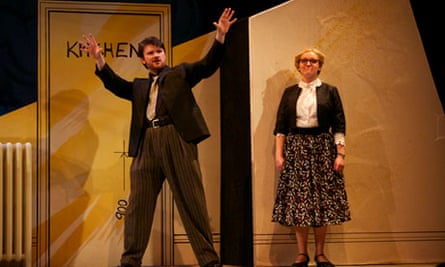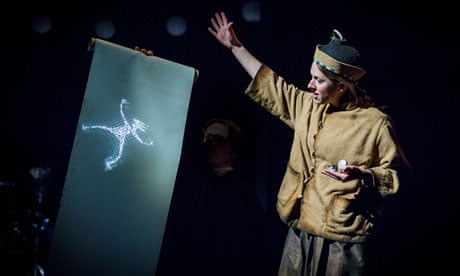Some novels read like film scripts. You know it's only a matter of time until Hollywood competes for the rights. Philip Pullman's fairytale The Firework-Maker's Daughter instead has all the staples of opera: the father-daughter relationship beloved of Verdi, a Wagnerian-style quest to find not gold but royal sulphur, a trial by fire and water, and the importance of the number three, which Mozart explored so elaborately in The Magic Flute. There's even a love-interest subplot between two elephants, and why not?
Now David Bruce and Glyn Maxwell, composer and librettist, have realised the book's operatic potential in a captivating chamber piece for five singers, two puppeteers and small ensemble. Given its world premiere by the Opera Group and Opera North, and co-commisioned by ROH2, it tours the UK until June. The second performance at Hull Truck theatre, which I saw, was blighted by bad weather and cancellations so the outstanding team had to perform to a few rows of children and a few elders.
Undeterred, cast and players created an enchanting atmosphere using old techniques to fresh effect, the equivalent of "slow lane" theatre where shaking a stretch of silk or making an elephant's trunk move with the aid of a piece of string and stick was all that was needed to create magic. Director John Fulljames, designer Dick Bird and choreographer Victoria Newlyn have worked ingenious spells. Pullman's story of plucky Lila – the spirited Mary Bevan – who is determined to become a firework-maker like her father (Wyn Pencarreg), helped by her friends Chulak (Amar Muchhala) and Hamlet, a great white elephant (James Laing), is full of generically eastern adventure. Andrew Slater as Rambashi, the hopeless pirate, adds plenty of humour.
Bruce's vivid music, skilfully played by Chroma and conducted by Geoffrey Paterson, mixes the colours of snake-charmer piccolo, gamelan and folk-inspired accordion to delicate effect. He swaps styles as you might a hat or a mask. As he puts it in a programme interview: "I have a funny relationship with other musical cultures: it's almost the opposite of what you're supposed to do if you're a good composer, which is to gain a massive in-depth knowledge of the music and take some structural meaning from it then recreate it."
The vocal writing, sometimes echoing Britten in The Turn of the Screw without the ghosts, has moments of strong emotional truth. The words are audible but it helps to know the story. Many a parent, enjoying themselves thoroughly, may bewail the short attention span of their offspring who perhaps have no patience for magic lanterns or shadow puppets. But the mournful, lovesick crooning of a countertenor elephant may touch them quite in spite of themselves. If so, they have tasted the first fruits of opera addiction.
In Manchester, the Hallé continues its wise policy of performing major concerts more than once. Last week the programme (also broadcast on Radio 3) was a pair of symphonies, Mahler's Fourth and Haydn's 104th, the "London". You could sense the players' close affinity with each work. The Mahler, now such a familiar concert piece though once regarded with deep suspicion, ends with a celebration of heaven as seen by a child. Ailish Tynan was a glorious, wide-eyed soloist, bringing a warm and keenly spontaneous performance to an ethereal close.
The Haydn, taken at a vigorous pace with nimble detail and elan, was joyful music-making of the most rewarding kind. Mark Elder, the Hallé's music director since 2000, reminded us beforehand how revolutionary Haydn, "father of the symphony", was. That power of invention was reflected in every bar of a buoyant performance. No nickname could be more frustrating or misleading than his: "Papa" Haydn prompts expectations of staidness and stolid, good behaviour. Hardly fair for a genius of deadly wit and fertile ingenuity, even if he did put his best clothes on to write music – his way of serving God. He didn't set out to solve the problems of the world, as it can seem his fellow Austrian Mahler did. Haydn's agenda was purely musical. Never have his symphonies been more in need of revisiting. The Hallé play the 100th, "Military", on 13 April.

Much of the talent for both Opera North and the Hallé springs from the Royal Northern College of Music. This has been bleak period for the RNCM, dealing with a sexual abuse scandal while at the same time trying to showcase its considerable achievements in 40th anniversary celebrations. Only the highest praise can be heaped on its scintillating staging of Cheryomushki, or Paradise Moscow, Shostakovich's comedy-satire on Soviet attempts at providing affordable housing in the 1950s. It hardly sounds a laugh a minute but believe me, it is, especially in David Pountney's now classic rhyming translation, re-scored for large dance band by Gerard McBurney.
With some of the best dancing you'll see on a UK opera stage, a uniformly excellent cast (you want names? OK, look out for 23-year-old baritone Benjamin Lewis) stylishly conducted by Alexandre Bloch and directed by Stefan Janski, I'd happily have sat through it again. The snow and ice has gone, the chorus sings, it's spring and the mimosa's on sale. All Soviet propaganda, of course, but we can hope.

Comments (…)
Sign in or create your Guardian account to join the discussion